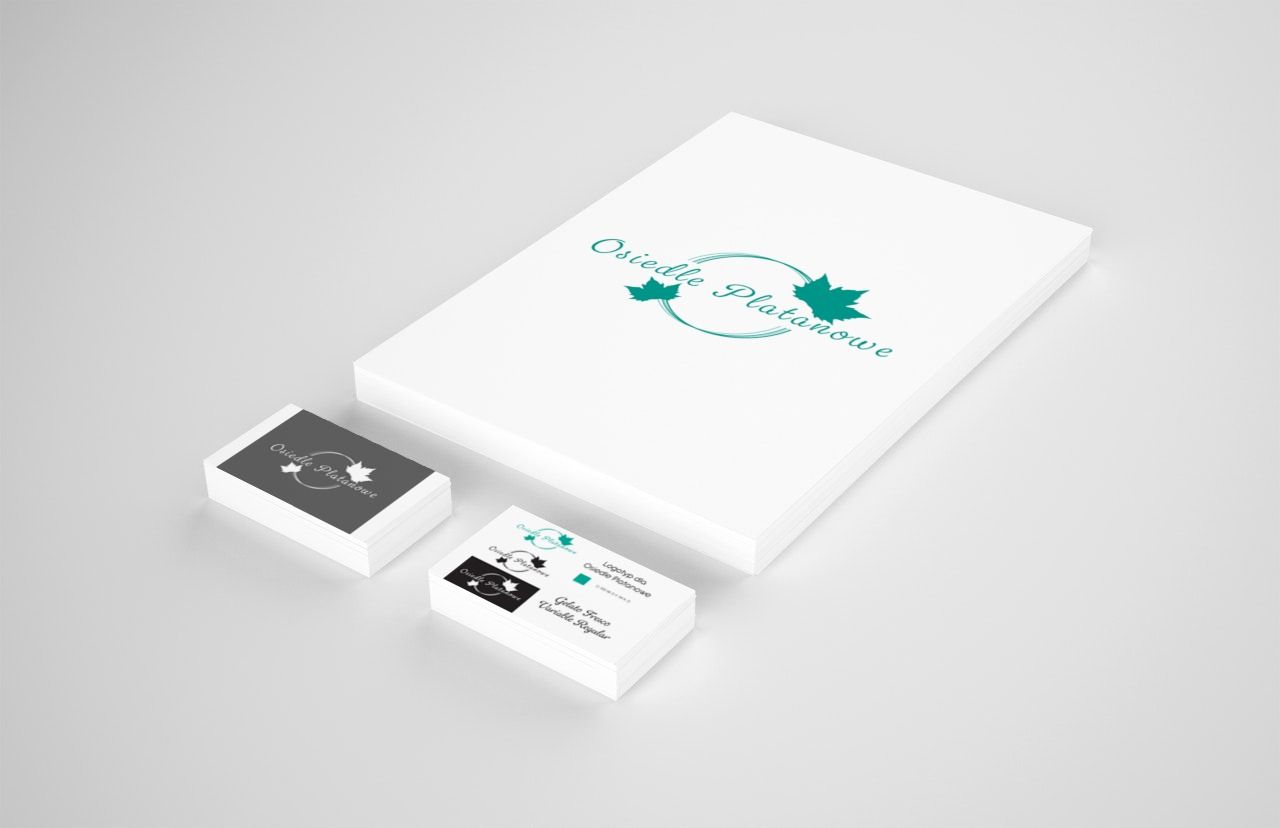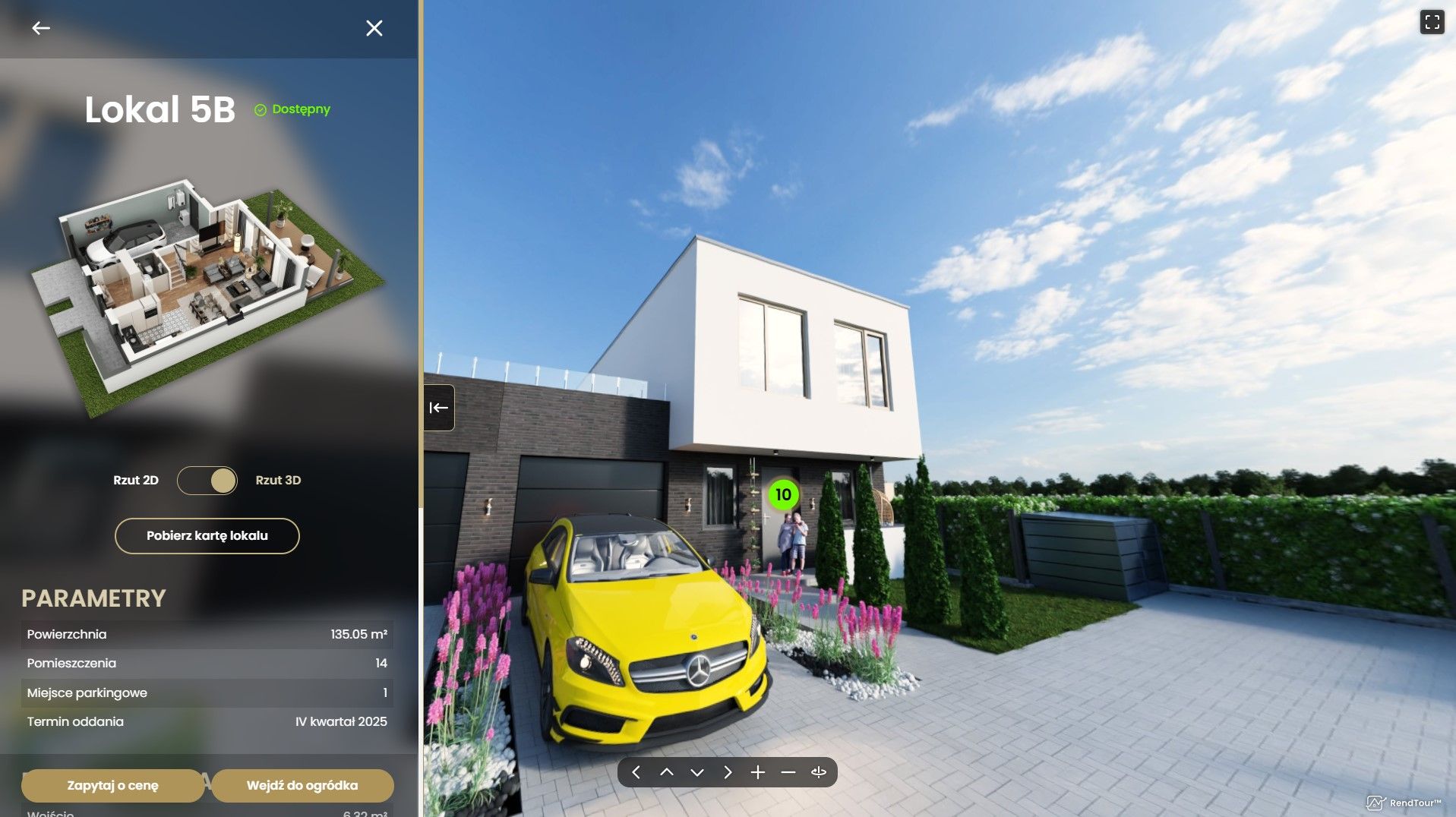
3D Visualizations of a Housing Estate - Developer Guide
...
Discover 7 effective marketing strategies for real estate developers that will help make your property investment stand out and attract clients.
Marketing in the real estate development industry can be challenging—the market is saturated, and clients are increasingly demanding.
So how do you stand out and reach potential buyers?
We’ve put together 7 proven strategies to help you effectively promote property investments and attract client interest.
But before diving in, let's address an important question.

This is a question many real estate developers ask at the beginning of their promotional efforts.
Should you focus on promoting a specific property investment or building the company’s brand?
The answer depends on your goals and the stage of business development.

If your priority is selling a specific project—like a new residential estate, apartment complex, or house—then most of your marketing efforts should focus on it.
Property investment marketing is more “tangible” for potential clients because it showcases what directly interests them: location, 3D visualizations, floor plans, interior mock-ups, 3D floor plans, photos, finishing standards, and amenities.
For this, tools like Google Ads, social media, open house events, and content marketing work well to quickly draw attention to a particular property.

On the other hand, building a real estate developer's brand is an investment in long-term trust.
If you’re interested in establishing a recognizable market presence and building a solid reputation, it’s worth investing in brand marketing as well.
A strong developer brand helps with future projects since satisfied clients are more likely to return or recommend your company to others. This is a more strategic approach, focusing on reputation, service quality, and your company’s unique values.
Real estate developer marketing is a process designed from A to Z to ensure that the sale of your residential property investment goes quickly, efficiently, and predictably.
It’s not just about advertising.
It’s a strategy that starts long before the first shovel hits the ground.
From building the brand of the investment, through identifying the target group, to generating and closing leads.
In practice?
It’s a mix of online and offline activities with one goal: to lead the client straight to your sales office.
All of this has one goal: to maximize return on investment and shorten sales time.
Today, without a strategy and a digital approach, it simply won’t work. Clients are online – you need to be there too, before they go to the competition.
If you’re just starting or have a limited number of investments, focus on marketing a specific property investment for faster sales results.
If you already have an established market position or plan to launch a series of projects, it’s wise to invest in both brand building and investment marketing simultaneously.
Ultimately, these two approaches can complement each other: by promoting the investment, you also strengthen the image of your company. The best approach is to find a balance that builds both property and developer recognition.
Your website is the first place where clients seek information about you and your property investment. It’s your business card and one of the most important sales tools.
Tip: Consider adding a blog section to publish property news, positively impacting SEO and search engine rankings.

Online advertising is a quick way to reach potential clients. With Google Ads and Facebook Ads, you can precisely define your target audience and show ads to people looking for properties in your area.
Tip: Set up remarketing campaigns to remind people about your offer if they’ve visited your website but haven’t made a decision.

Real estate developers often focus on facts and numbers, but it’s worth showing emotion, too.
Create content that grabs attention and shows the value of the property investment.
Example: If your property investment is near a park, describe how future residents can enjoy green spaces, bike paths, and local attractions.
People don't have time to read long paragraphs, so make sure your paragraphs are short and concise. If you're struggling with clarity or structure, ghostwriters from Academify can provide professional help to refine and improve the text you write, ensuring it captures attention and delivers your message effectively.

Social media is a great tool for brand awareness and engaging with potential clients.
Tip: Keep an active account and respond regularly to comments—engagement builds trust.

Nothing is more convincing than seeing an apartment in person.
Open houses are a great opportunity for clients to experience your property investment firsthand.
Tip: A 3D virtual tour also increases the time spent on your site, which helps with SEO.

Customer reviews can be crucial in choosing an apartment. Ensure that your website and social media include testimonials from satisfied clients.
Tip: Remember that good reviews can also be achieved through professional post-sale service—clients appreciate feeling cared for even after the transaction is finalized.

SEO (Search Engine Optimization) is key to increasing your website’s visibility in search results.
Tip: Local SEO promotes your offer locally - list your business on Google My Business, update contact info and hours, and add photos regularly.

Well-planned marketing for real estate developers can yield measurable results that translate into sales, brand image, and client trust. In the real estate sector, competition is high, and investments require significant financial outlay, making an effective marketing strategy essential for project success.
Marketing helps increase the visibility of both the developer and specific property investments. Well-planned advertising campaigns, SEO, and social media presence ensure your offer is seen by potential clients on the platforms where they actually look for real estate—Google, Facebook, Instagram, and real estate portals.
Result: More people will become aware of your property investment, increasing the likelihood of faster interest and sales.
Real estate is often a client’s most important investment, making trust in the developer essential. Marketing helps establish your reputation as a reliable, professional partner who prioritizes quality and client needs.
Thanks to positive reviews, referrals, engaging content, and social media presence, your brand can become recognizable and trusted.
Result: Clients are more likely to choose your offer if they trust your company and view its reputation positively.
Tools like Google Ads, Facebook Ads, and local targeting in SEO allow you to reach exactly those individuals looking for properties in specific locations or within certain age, demographic, and even financial brackets.
Result: You increase the chances that people genuinely interested in buying an apartment or house will see your ad, optimizing costs and improving campaign efficiency.
Marketing shortens the sales cycle through effective tools that guide clients from initial interest to finalizing the transaction. A professional website, appealing visual materials, virtual tours, and open house events make it easier for clients to decide to buy.
Result: An increase in leads, better conversion rates, and ultimately faster sales of apartments or houses.
Marketing isn’t just about sales; it’s also about building relationships with current and future clients. Regular communication, newsletters, social media, and post-sale support make clients feel valued, while satisfied clients readily recommend your company to others.
Result: You increase client loyalty, with clients who may return or recommend your brand to friends.
A sustained marketing presence is an investment in growing your real estate developer brand. The more recognizable you are and the stronger your reputation as a reliable market player, the easier it will be to execute future projects. Clients will start associating your company with quality and trust, enhancing your competitive advantage.
Result: Long-term growth in market position, facilitating future projects and increasing brand value.
Marketing allows you to better understand clients' needs and expectations, which can help tailor offers and plan future investments. By analyzing campaign results, you can better understand which locations, layouts, and amenities generate the most interest.
Result: You optimize the marketing budget and better prepare to execute projects that address real market needs.
Marketing for a real estate developer is an art that requires a strategic approach and diverse actions. A professional website, advertising campaigns, social media, open house events, client reviews, and impact SEO combine to form an effective marketing ecosystem that helps attract attention and build relationships with clients.
Using these techniques, you increase the chances of your property investment’s success and secure a stable position in the real estate market.
Yes, online advertising allows you to reach a precisely defined target group, significantly increasing campaign effectiveness. With online advertising, you can quickly generate leads and direct offers to people interested in purchasing real estate.
Instagram and Facebook work best, allowing for photos and videos essential in real estate. LinkedIn is effective for premium and commercial investments, especially if you want to reach professionals and investors.
The website should feature blog articles about the location, lifestyle in the area, amenities, available floor plans, and construction updates. This type of content adds value to the site and improves its SEO.
Top SEO strategies for developers include local optimization (e.g., phrases related to the property’s location), publishing valuable content (a blog about the area and property lifestyle), and obtaining links from industry sites and real estate portals. Also, take care of technical SEO: fast page loading, SSL certification, and responsiveness.
Open houses are events where potential clients can visit the property, see interiors, and ask questions in person. It’s an excellent opportunity to build relationships with clients, spark their interest, and answer all their questions in direct interaction. Open house events can significantly speed up purchasing decisions.
Yes, virtual tours are an excellent tool, especially if the property is under construction or clients cannot visit in person. A 3D virtual tour gives clients a detailed view of the apartment, increasing their interest and encouraging faster purchase decisions.
High-quality photos and 3D visualizations of finished interiors and the building’s surroundings work best. Photos should highlight space, light, views from the windows, and attractive details. Investing in professional photography is worthwhile since well-done visuals strongly impact first impressions.
Remarketing is a way to remind clients who have visited your site but haven’t decided to buy. It gives you a chance to “return” to potential clients and attract their attention again, increasing conversion and ultimately leading to a sale.
The marketing budget depends on the size of the investment, location, and target group. Generally, many companies allocate 5-10% of the project’s budget to marketing activities. It’s wise to consult a marketing agency to appropriately plan campaigns based on sales goals and project specifics.
Yes, client reviews are very important, especially in real estate, where trust is key. Satisfied clients can be your best advertisement, and positive reviews help build credibility. Encourage clients to share their experiences on platforms like Google, Facebook, or industry portals.
Social media content should include construction updates, interior visualizations, open house recaps, client reviews, and information about the investment area. Videos with virtual tours work well too, as they attract attention and encourage engagement.
12. Is LinkedIn advertising effective for real estate developers?
LinkedIn advertising can be very effective, especially if you’re promoting premium or commercial investments and want to reach professionals, investors, or corporate clients. LinkedIn offers advanced targeting, allowing you to precisely select the audience based on industry, job title, or location.
A branding campaign focuses on building brand awareness and trust, rather than direct sales. It’s especially important for developers who want to build a market reputation and stand out as reliable, trustworthy partners. Branding campaigns impact brand perception and can bring long-term benefits, attracting loyal clients.
- Lack of a cohesive strategy - no clear plan or goals for the campaign.
- Poor content quality - lack of professional photos, insufficient attention to content and descriptions.
- Not targeting the right audience - running campaigns without appropriate targeting.
- Lack of analysis and optimization - not tracking campaign results or making improvements.
Avoiding these mistakes can significantly improve the effectiveness of your marketing efforts.
Publishing a blog is an excellent way to increase search engine visibility (SEO), build a reputation as an expert, and engage clients. You can create articles about the property location, amenities, real estate trends, and tips for buyers. A blog attracts organic traffic and makes your site more frequently visited by potential clients.
Book a free consultation.
Sign up now for our free RendProletter and receive 1 email every week with a short summary of the best posts from our blog and emails with unique offers you won't find anywhere else!